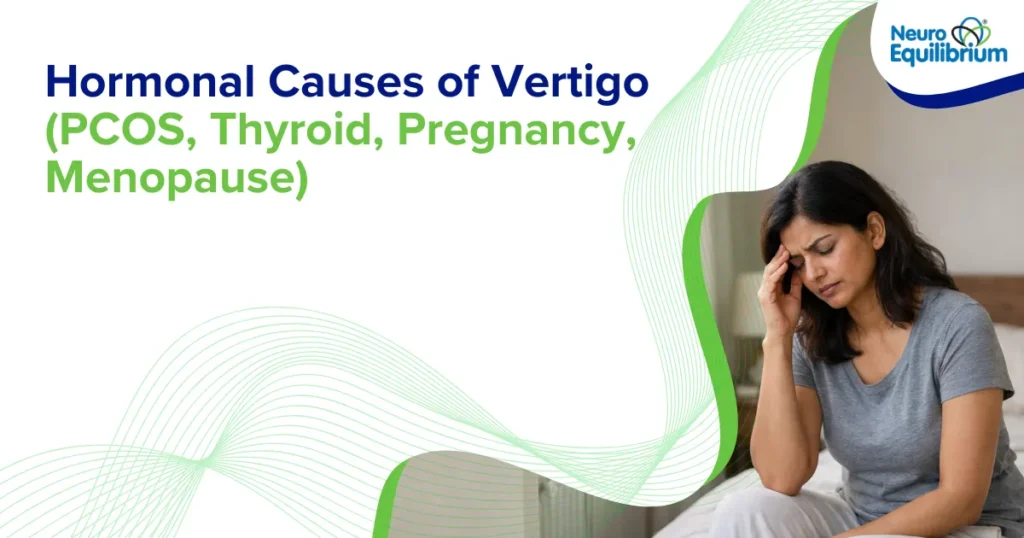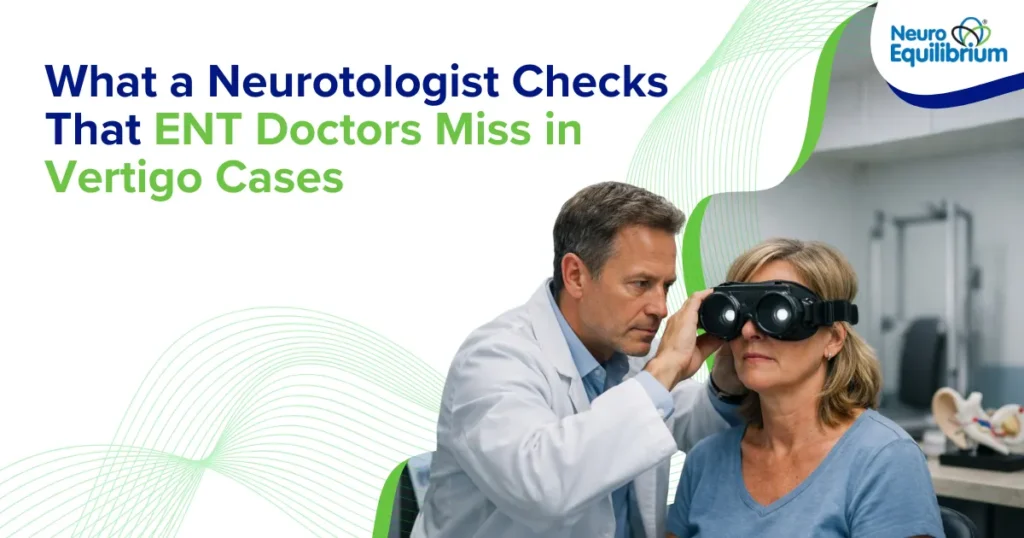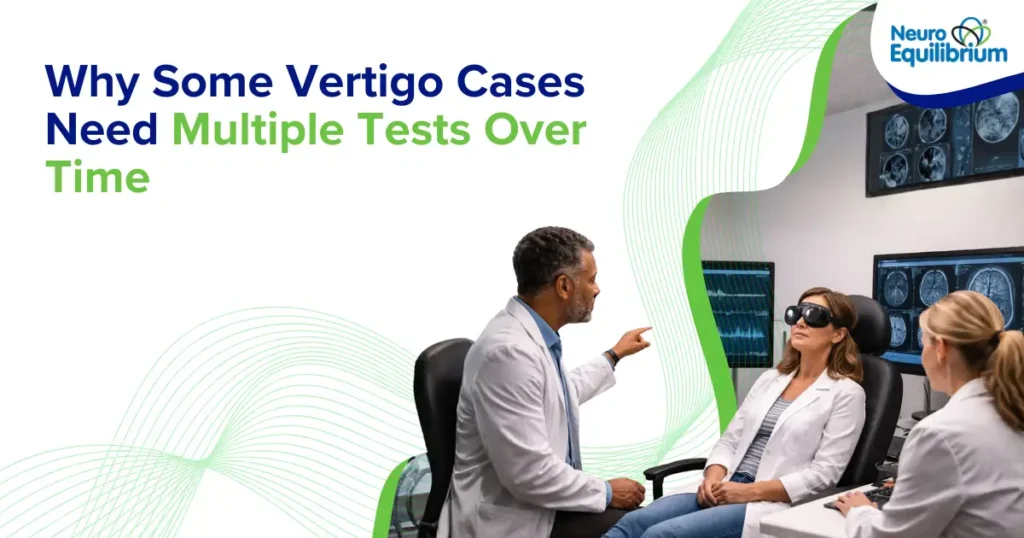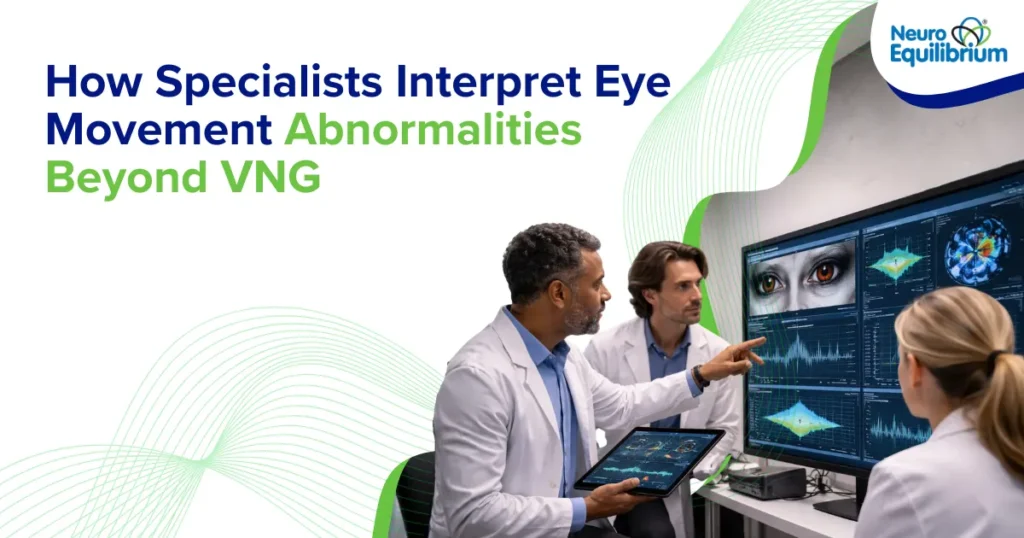Vertigo Symptoms: Understanding the Warning Signs
Vertigo is not a disease itself. It is a symptom that causes you to experience rotation, movement, or swaying even when you are not. This strange feeling happens due to issues in the body’s balance system, which depends on the inner ear, brain, eyes, and signals from muscles and joints.
Knowing the symptoms of vertigo can make you aware of what to expect, when to seek help, and what possible causes might be behind the dizziness. Understanding vertigo symptoms and causes early helps in faster diagnosis and treatment.
Know More About Vertigo
- What Is Ear Balance Treatment and When Do You Need It?
- How Vertigo Is Diagnosed at NeuroEquilibrium
- Can Vertigo Be Cured Permanently?
General Vertigo Symptoms
People with vertigo may experience:
- Spinning sensation (true vertigo): Feeling as if you or the room is rotating.
- Dizziness or lightheadedness: Wooziness or the feeling of being about to faint, different from spinning vertigo.
- Unsteadiness or imbalance: Trouble standing or walking, fear of falling.
- Nausea and vomiting: Often linked to sudden episodes.
- Blurred vision or difficulty focusing: Eyes may not stabilize images during movement.
- Motion sickness: Sensitivity to travel or busy environments.
- Spatial disorientation: Trouble knowing which way is up or down.
- Headaches or neck pain: Often connected to migraines or muscle tension.
- Sensitivity to light and sound: Seen in vestibular migraines.
- Weakness or fatigue: Feeling drained during or after an episode.
While these vertigo symptoms can occur in anyone, some studies suggest the symptoms of vertigo in women are often linked to hormonal changes, migraines, or stress.
Vertigo Symptoms by Cause
a) Benign Paroxysmal Positional Vertigo (BPPV)
Attacks that take less than a minute to spin.
Activated by lying down, turning in bed, bending, or glancing up.
No ear ringing and normal hearing.
Nausea or vomiting may occur.
Brought about by small crystals of calcium that flow into the inner ear canals.
b) Cervical Vertigo (Dizziness with Neck Pain)
The symptoms of vertigo such as imbalance or lightheadedness are common and tend to worsen with neck movement.
May be related to whiplash, posture, or tension headaches.
Attacks are sometimes accompanied by neck pain overlapping with vestibular migraine.
c) Peripheral Vertigo (Inner Ear Causes)
- Meniere’s Disease: Vertigo with fluctuating hearing loss, tinnitus, and ear pressure.
- Vestibular Neuritis: Severe vertigo for days, usually without hearing loss.
- Labyrinthitis: Includes vertigo and hearing loss; needs urgent care.
- Otolithic Disorders: Cause imbalance and shaky vision.
- Perilymph Fistula: Small fluid leak leading to dizziness and hearing issues.
- Vestibular Paroxysmia: Sudden dizziness due to nerve compression.
- Superior Semicircular Canal Dehiscence (SSCD): Vertigo triggered by loud sounds, coughing, or sneezing.
d) Central Vertigo (Brain or Nerve Causes)
Gradual onset, often with:
- Weakness or numbness in limbs
- Slurred speech
- Double or blurred vision
- Severe headache or poor coordination
Causes include stroke, multiple sclerosis, tumors, and acoustic neuroma. Hydrocephalus can also cause imbalance and cognitive decline.
e) Gastric or Anxiety-Related Vertigo
Vertigo is commonly accompanied by nausea and vomiting.
PPPD (Persistent Postural-Perceptual Dizziness) may be caused by anxiety.
Vertigo may increase due to stress and fatigue.
It can also be confused with conditions such as low blood pressure, diabetes, or medication side effects.
f) Eye-Related Vertigo Symptoms
- Nystagmus: Jerky or uncontrolled eye movements.
- Blurred vision during movement: Linked to a weak vestibulo-ocular reflex.
- Double vision: May point to central causes like stroke or tumors.
Vertigo Attack Symptoms
During an attack, you might suddenly experience the room spinning, loss of balance, and difficulty focusing. The most common vertigo symptoms include nausea, vomiting, and fear of falling. Some attacks last only a few seconds, while others can persist for hours or even days.

Vertigo Symptoms and Causes: The Connection
Vertigo can be linked to:
- Inner ear disorders such as BPPV, Meniere’s disease, and neuritis.
- Brain-related causes including stroke, migraine, and multiple sclerosis.
- Medical issues like anemia, diabetes, vitamin deficiencies, or dehydration.
- Stress, anxiety, or posture problems.
Recognizing vertigo symptoms and causes is the first step toward effective management.
Treatment Options
- Repositioning maneuvers: Simple head and body movements for BPPV.
- Vestibular rehabilitation therapy: Exercises to retrain balance.
- Medications: For short-term relief or specific underlying conditions.
- Lifestyle changes: Low-salt diet for Ménière’s disease, avoiding stimulants that trigger migraines, and maintaining hydration.
- CBT (Cognitive Behavioral Therapy): Useful for anxiety-related dizziness and PPPD.
When to See a Doctor
Consult a physician when vertigo symptoms are frequent, chronic, or disrupting your daily life. Immediate medical attention is needed if you experience:
- Acute loss of vision or blurred vision
- Speech problems
- Weakness or numbness
- Severe headache
- Ringing or hearing loss
- Loss of consciousness or chest pain
NeuroEquilibrium: Your Partner in Vertigo Care
At NeuroEquilibrium, we understand how distressing vertigo symptoms can be. Our advanced diagnostic tests go beyond standard check-ups to identify the exact symptoms of vertigo and causes behind your imbalance.
We provide:
- Precision-guided repositioning maneuvers
- Customized vestibular rehabilitation therapy
- Technology-supported recovery like virtual reality-based exercises
- Medication and follow-up for conditions such as vestibular migraine, labyrinthitis, or Meniere’s disease
If you have been experiencing dizziness, spinning, or imbalance, recovery begins with a proper diagnosis. Call NeuroEquilibrium and take the first step to live with balance and confidence.
Sources
- “Vertigo — Symptoms of Ear Disorders / Dizziness and Vertigo.” MSD‑Manuals. https://www.msdmanuals.com/home/ear-nose-and-throat-disorders/symptoms-of-ear-disorders/dizziness-and-vertigo (MSD Manuals)
- “Labyrinthitis and Vestibular Neuritis.” NHS (UK). https://www.nhs.uk/conditions/labyrinthitis/ (nhs.uk)
- “Symptoms of Vertigo.” Healthdirect (Australia). https://www.healthdirect.gov.au/vertigo (Healthdirect)
- “Vertigo: Symptoms, Causes, and Treatment.” Apollo Hospitals. https://www.apollohospitals.com/diseases-and-conditions/vertigo (apollohospitals.com)
Who is this blog on vertigo symptoms meant for?
The content of this guide is aimed at patients with symptoms of dizziness, spinning or balance, and at caregivers whose patients have these symptoms and wish to learn about the potential causes and remedies.
What are the most common symptoms of vertigo?
The spinning feeling, dizziness, nausea, imbalance, blurred vision, motion sickness and at times headaches or sensitivity to light and sound are the main symptoms.
What conditions can cause vertigo?
Inner ear issues (such as BPPV, Meniere disease, or labyrinthitis), brain issues (stroke or migraine), neck issues, anxiety, and even vision disturbances can be the cause of vertigo.
How is vertigo treated?
Depending on the cause of treatment is necessary. There are repositioning maneuvers, therapy with vestibular rehabilitation, pharmacologic, lifestyle, and anxiety-related dizziness therapy.
When should I see a doctor for vertigo?
Consult a doctor when vertigo is persistent, common, or interferes with the quality of life. These problems are life-threatening and may require urgent treatment: sudden hearing loss, vision, slurred speech, serious headache, and weakness.
















